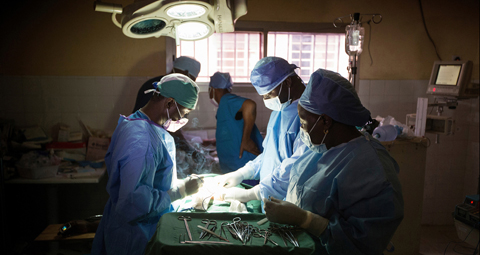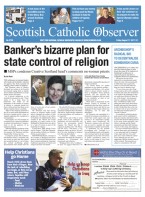April 13 | ![]() 0 COMMENTS
0 COMMENTS ![]() print
print

Last Rites at my husband’s bedside
DOROTHY CUMMINGS MCLEAN reflects on the most harrowing Lent she has ever experienced
WHEN I married and moved to Edinburgh, I was surprised to discover that my husband had never signed up with a local surgery, dentist or optician. I formed an impression that Scotsmen don’t go to doctors unless Scotswomen force them, and this was strengthened when the medical centre allowed me to sign up my husband without his permission.
At the time, I found this hilarious. I nagged Mark into his first appointment, during which he was told he drank too much. I had been told I weighed too much, so we were even.
My family back home aren’t daily drinkers, so I was pleased, not alarmed, when Mark declared he no longer liked the taste of wine.
When he lost weight, we assumed it was the missing booze. When he said his neck always hurt when he woke up, I observed that we were long overdue for a new mattress.
But when Mark complained of pain behind his left eye, I began to lobby for his return to the doctor.
He was finally frightened into it by reading about the English food critic AA Gill, who had announced in a café review that he had ‘the full English of cancer.’ Mr Gill, who died in December, had lost a lot of weight over the summer and experienced pain in his neck. In early February Mark called the clinic. I was in Canada at the time, and I was astounded when Mark told me over the phone that he had got an appointment the same day he phoned.
“They were so amazed that a man made his own appointment that they thought you must be dying,” I joked.
The doctor advised Mark to see an eye doctor, so he made an appointment at my usual Specsavers. The optician contacted Edinburgh’s Eye Pavilion, and the specialists sent Mark a letter asking him to come in on March 7.
The morning of March 7 was sunny and fine, but I grouched as I accompanied Mark to his appointment. First, I had a bad cold, and, second, I needed coffee. Not just any coffee. I needed good coffee, coffee from my favourite hipster café.
We quarrelled over whether or not I could get this coffee and make it to Mark’s appointment. In the end, we took different routes, and I felt terribly smug when I met Mark at the doors of the Eye Pavilion, snazzy coffee in my hand. While Mark was being examined, I wrote a jokey letter to a friend about how Scottish doctors, having finally got a man in their hands, were sharing him around.
I later tore up this letter.
After Mark’s appointment, he went to work and I, coughing, went home. At 5pm Mark got a call from the Royal Infirmary saying that he had to come in at once. I grabbed Elizabeth David’s French Provincial Cooking, joined Mark at his office and resigned myself to a long wait in A&E.
The sun was gone and, as the doors to A&E were broken, a cold wind blew into the waiting room. Mark was eventually called into some inner chamber, and then sent out back to wait.
He was called in a second time and sent out to wait again. The third time he was called in, I decided to go with him. This turned out to be a good idea, for after drawing a blue curtain around our chairs, a doctor told us that Mark had a brain tumour and had to be admitted to the Western General at once. We were stunned.
The doctor explained that the tumour had blocked fluid in Mark’s brain, which was why there was pain behind his eye. Not being a specialist, she couldn’t say if the tumour itself was malignant or benign. She went away to let the news sink in.
“What a good thing I went to Confession on Saturday,” Mark said.
Icalled a neighbour with a car. Mark called our priest. We made our plans: Angela would drive us home to pack overnight bags, take us to Father’s house for Last Rites, and then leave us at Western General.
When we explained this to the doctor, she dissented. I could go home for a suitcase, she suggested, but Mark had to go to Western General at once.
“I’m not leaving my husband,” I said.
“I want Last Rites,” Mark said.
The doctor stopped arguing. Within half an hour, Mark and I were kneeling on either side of the aisle of the tiny chapel of the Fraternity of the Priests of St Peter (FSSP) while Father began the prayers of what I grew up calling the Sacrament of the Sick.
For once I could barely understand the Latin of the Old Rite, and my tongue faltered on the Pater Noster. All I could think was, ‘This is really happening,’ and ‘He’s only 44 years old.’
We borrowed books. Mark took Blessed Be God, and I supplemented French Provincial Cooking with Helen Waddel’s Beasts and Saints. Ten minutes later we were at Western General.
The nurses on the neurology ward were waiting. They showed Mark to a bed in a men’s ward and hinted that I go home. “I’m not leaving my husband,” I repeated, and a kindly nurse reserved me the ‘relative’s room’ upstairs. Mark and I were shown into a sitting room at the end of the hall to await the registrar.
It was very cold. To keep cheerful, we talked about Italian holidays and this year’s Chartres Pilgrimage. When the registrar arrived, he explained that Mark’s condition was so bad that at any moment his brain might collapse in on itself, sending Mark into an irreversible coma. The operation would take place around noon. It would be dangerous. “Try to get some sleep if you can.”
I kissed Mark goodnight and went upstairs to the relative’s room. It was freezing cold, and I shivered, coughed, sneezed and wept. I attempted to read Beasts and Saints but, as I didn’t believe a word of it, it wasn’t much comfort. By 2:45am I felt so crushed by loneliness that I broke down and called my parents on my mobile. I wouldn’t cry in front of Mark, so my poor parents got the brunt.
“Try to be brave, dear,” my father said, and this paternal advice calmed me down enough to go to bed (in all my clothes) and to fall asleep after a few soothing pages of French Provincial Cooking. May Elizabeth David rest in peace, and may God’s perpetual light shine upon her.
In the morning I made myself a cup of the instant coffee I found in a corner of the room and, despising myself for yesterday’s coffee battle, was grateful for it. When I met Mark again, I was all jokes and smiles and stiff upper lip. He sat up in bed, and I sat beside it with my feet stuck under the covers. We smiled at each other and chatted again about our adventures. Mark praised his borrowed prayer book. I pestered the nurses for cups of tea and silently prayed they wouldn’t throw me and my cold germs out of the ward.
When an orderly came in to do a particularly intimate exam, I rushed out for the only food I could then find: takeaway from McDonald’s. It was, in a strange way, the most beautiful morning of our eight-year marriage.
After noon the neurosurgeon arrived with a nurse to wheel my husband away to the operating theatre. Mark had already been warned of the dangers and made to sign several forms. Now he was warned again.
“Just a moment,” my husband said. “I want to reread this Act of Contrition.”
He read for a minute, and for the first time since his diagnosis, I saw tears in his eyes.
“It’s really very beautiful,” he explained and cleared his throat.
I followed the bed to the elevator and kept up my smile until the hateful doors shut between me and life as I knew it. In Canada, my eldest brother was hastily packing for his flight to Scotland, but for the moment I was alone, totally alone.
But no—not totally alone, for I knew that Someone was waiting to be with me while I waited. Mark’s last words to me had been ‘Rattle your beads, hen.’
He had my Rosary, but I still had ten fingers to count with. Thank God there is still a chapel at Western General.
It is officially multi-faith—a Muslim girl was praying towards Mecca when I entered—but in a west-facing corner there is a wooden cross standing on a Communion table beside the Holy Bible. I knelt before them and prayed for my husband’s life.
At about a quarter to four that afternoon, a doctor rang my mobile. Mark was awake and ‘as bright as a button.’ I could come to the ward and see him at five. I was there at ten to. Mark looked pale, and blood was seeping into a great white bandage on his head, but he was alive and smiling.
The fluid drained successfully. The tumour, we were told, is probably benign. March 7, the day it was discovered, is the Feast of St Thomas Aquinas by the Old Calendar, and so Mark has named it Thomas.
I thank God daily that my husband is still alive—which reminds me of my mother’s stroke during Advent 1996. She fully recovered, and that Christmas, my father says, was his favourite ever. I suspect, therefore, that this will be my happiest Easter. It has certainly been my most harrowing Lent.











